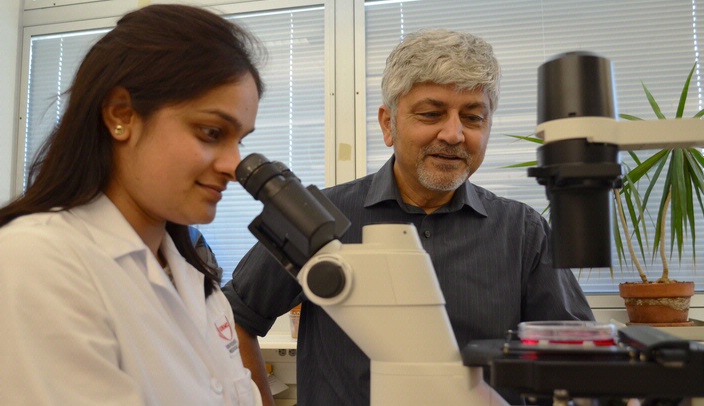A University of Nebraska Medical Center researcher has discovered that a common form of glaucoma that strikes adults may have early origin. The discovery, which is detailed in the August 9 issue of the journals Stem Cells, could result in earlier diagnosis and treatment of the disease that is the second leading cause of irreversible blindness and affects more than 3 million people in the United States and 60 million people worldwide.
Iqbal Ahmad, Ph.D., a professor in the department of ophthalmology and visual sciences at UNMC, led the team of investigators. He has spent more than a decade studying the stem cell approach to understand and treat glaucoma, which is called a silent robber of vision because it strikes without warning or any noticeable symptoms.
“There are several forms of glaucoma but all have two things in common – the progressive degeneration of retinal ganglion cells (RGCs) and the irreversible loss of vision,” Dr. Ahmad said.
The primary function of RGCs is to tell the brain through a series of synapses and connections what the eye sees, he said. Without RGCs, there is no perception of vision.
Since glaucoma is generally a late onset disease and RGCs are formed during gestation, Dr. Ahmad’s team had to find a way to study the degeneration process, which they hypothesized was because of a developmental abnormality.
Using blood from patients carrying a specific gene variation and also suffering from primary open angle glaucoma (POAG), one of the more common forms of the disease, Dr. Ahmad and his team created a pluripotent stem cell-based model of POAG to understand why and how RGCs degenerate.
Dr. Ahmad’s team was able to show that RGCs from POAG patients were different from those generated from healthy donors.
“They were developmentally abnormal in form, function and gene expression,” he said, adding that knowing the molecular basis of the defect and its biomarkers will allow early diagnosis and treatment.
“We are excited, as it is an important first step toward early diagnosis and treatment of this debilitating disease,” Dr. Ahmad said.
Shane Haven, M.D., a glaucoma specialist at UNMC’s Truhlsen Eye Institute, said, “Dr. Ahmad’s work could help us better understand the pathophysiology of degenerative conditions and in turn, reveal new treatment targets and cell replacement therapies.”
We are Nebraska Medicine and UNMC. Our mission is to lead the world in transforming lives to create a healthy future for all individuals and communities through premier educational programs, innovative research and extraordinary patient care.
Twitter | Facebook | Instagram | YouTube | Flickr
